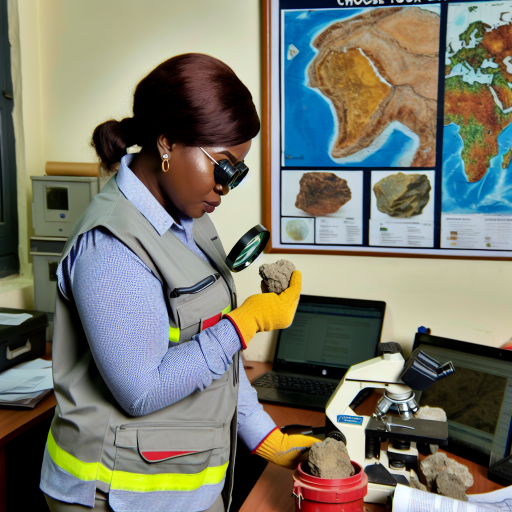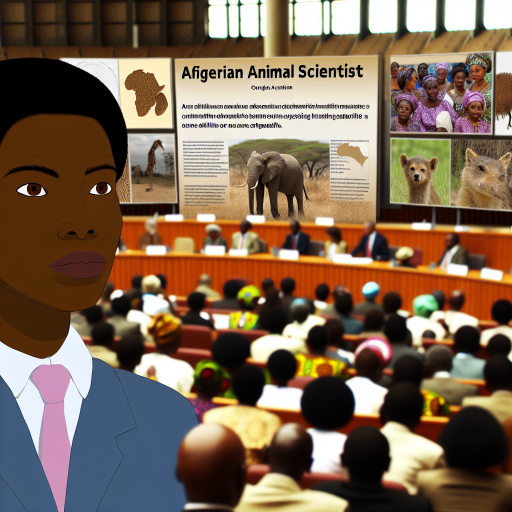Introduction:
Animal science education in Nigeria plays a crucial role in shaping the agricultural sector and contributing to economic development.
With a focus on livestock production, nutrition, and health, this discipline equips students with the knowledge and skills needed to manage animal resources effectively.
Lack of adequate funding:
- Insufficient government support for animal science programs
- Limited resources for research, equipment, and facilities
- Impact on quality of education and research output
One of the major challenges facing animal science education in Nigeria is the lack of adequate funding.
This issue encompasses several sub-elements that collectively contribute to the overall debilitating effect on the quality of education and research in the field.
Insufficient government support for animal science programs
Animal science programs in Nigerian universities often struggle to receive the necessary financial backing from the government.
This lack of support hampers the development and growth of these programs, making it difficult to attract top-tier faculty and students.
Limited resources for research, equipment, and facilities
Another aspect of the funding challenge is the scarcity of resources for conducting research, acquiring modern equipment, and maintaining proper facilities.
Without these essential tools, students and faculty are unable to engage in cutting-edge research and practical training.
Impact on quality of education and research output
The repercussions of inadequate funding are far-reaching, ultimately affecting the quality of education and research produced by animal science programs in Nigeria.
Subpar facilities, lack of equipment, and limited research opportunities lead to substandard graduates and insufficient contributions to the field.
Addressing the issue of funding is paramount to improving the state of animal science education in Nigeria.
By allocating more resources, increasing governmental support, and investing in modern facilities and equipment, the field can thrive.
It can produce high-caliber professionals who can make significant contributions to the agricultural sector.
Shortage of qualified faculty:
Lack of trained and experienced instructors in animal science.
Difficulty in attracting and retaining skilled professionals.
Negative impact on the quality of teaching and research.
One of the major challenges facing animal science education in Nigeria is the shortage of qualified faculty.
This issue stems from various factors, such as the lack of trained and experienced instructors in the field.
Without competent faculty members, students may not receive the necessary guidance and mentorship required for a comprehensive education in animal science.
Moreover, there is a continued struggle in attracting and retaining skilled professionals within the academic sector.
Many qualified individuals may choose alternative career paths due to better prospects or higher remuneration in other fields.
This results in a constant turnover of faculty and a lack of stability within educational institutions, which negatively impacts the quality of teaching and research.
The shortage of qualified faculty members also hinders the development of innovative research initiatives in animal science.
Without experts in the field, the capacity for groundbreaking discoveries and advancements in the discipline is limited.
This, in turn, affects the competitiveness of Nigerian animal science education on a global scale.
To address this challenge, there is a need for investment in training programs and professional development opportunities for current and aspiring faculty members.
By nurturing a pipeline of skilled educators and researchers, institutions can bridge the gap in expertise and ensure a sustainable future for animal science education in Nigeria.
Additionally, offering competitive salaries and benefits can help attract and retain top talent within the academic sector.
This fosters a culture of excellence and innovation.
Gain More Insights: Nigeria’s Most Promising Science Disciplines You Shouldn’t Ignore
Inadequate Infrastructure:
Inadequate infrastructure is a significant challenge facing animal science education in Nigeria.
The lack of properly equipped laboratories and research facilities hampers the quality of education that students receive.
Without access to these essential resources, students are unable to conduct experiments and gain practical knowledge that is crucial in the field of animal science.
Additionally, the absence of modern technology and resources for practical training further exacerbates the situation.
In a world that is rapidly evolving, it is essential for students to have exposure to the latest tools and techniques used in the industry.
Without access to these resources, students are not adequately prepared for the real-world challenges they will face in their careers.
The inadequacy of infrastructure not only limits students’ learning but also impedes their overall experience.
Transform Your Career with Expert Guidance
Get personalized mentorship consulting that’s tailored to your unique path. Our expert advice is actionable and exclusive.
Get StartedHands-on learning is a crucial aspect of education in animal science.
Without proper facilities and resources, students are unable to gain the necessary experience that will enable them to excel in their future careers.
To address this challenge, the government and educational institutions need to invest more in upgrading and maintaining laboratories and research facilities.
By providing students with access to modern technology and resources, they can enhance their practical training and better prepare them for the workforce.
It is crucial to prioritize infrastructure development to ensure that animal science education in Nigeria meets global standards and produces competent professionals in the field.
Inadequate infrastructure poses a significant obstacle to the advancement of animal science education in Nigeria.
By addressing this challenge and investing in the necessary resources, the quality of education can be improved.
Students can be better equipped for the demands of the industry.
It is imperative for stakeholders to work together to overcome this hurdle.
This will ensure that animal science education in Nigeria is at par with international standards.
Delve into the Subject: Everything You Need to Know About Biotechnology in Nigeria
Outdated curriculum:
One of the major challenges facing animal science education in Nigeria is the issue of an outdated curriculum.
The curriculum being used in many educational institutions does not reflect the current trends and challenges in the field of animal science.
This presents a significant problem as it hinders the ability of students to acquire the knowledge and skills needed to excel in the industry.
The curriculum in many animal science programs in Nigeria is filled with irrelevant and obsolete course content.
This means that students are being taught material that may no longer be applicable or useful in today’s rapidly changing world.
As a result, they are not adequately prepared to meet the demands of the modern animal science industry.
Furthermore, the outdated curriculum fails to address the current trends and challenges in animal science.
With advancements in technology and new discoveries in the field, it is essential for educational institutions to update their curriculum to reflect these changes.
Without this, students are left behind and are not equipped to tackle the challenges they will face in their future careers.
Another consequence of an outdated curriculum is that it limits students’ knowledge and skills needed for the industry.
As the curriculum does not include the latest developments and practices in animal science, students are not exposed to the most relevant information.
This ultimately affects their ability to compete in the job market and hinders their professional growth.
Addressing the issue of an outdated curriculum is essential for the improvement of animal science education in Nigeria.
By updating course content, addressing current trends, and providing students with the necessary knowledge and skills, educational institutions can better prepare their graduates for successful careers in the industry.
- Irrelevant and obsolete course content
- Failure to address current trends and challenges in animal science
- Limits students’ knowledge and skills needed for the industry
Find Out More: Top Science Disciplines Revolutionizing Research in Nigeria

Limited industry collaboration:
- Lack of partnerships with agriculture and livestock sectors
- Missed opportunities for internships, research projects, and job placements
- Hinders students’ practical exposure and industry readiness
One of the significant challenges facing animal science education in Nigeria is the limited industry collaboration.
This lack of partnerships with the agriculture and livestock sectors has detrimental effects on students’ overall learning experience and preparedness for the workforce.
Lack of partnerships with agriculture and livestock sectors:
The absence of collaboration between educational institutions offering animal science programs and the industry stakeholders in agriculture and livestock sectors is a major drawback.
This lack of connection deprives students of valuable insights into real-world practices, cutting-edge technologies, and industry trends.
Missed opportunities for internships, research projects, and job placements:
Without strong partnerships with industry players, students pursuing animal science degrees miss out on crucial opportunities for hands-on experience through internships, engaging research projects, and job placements.
These experiences are essential for honing practical skills, expanding knowledge, and networking within the field.
Hinders students’ practical exposure and industry readiness:
The limited industry collaboration hinders students’ practical exposure to diverse aspects of animal science and reduces their overall industry readiness.
Without direct interaction with professionals, access to industrial facilities, and exposure to real-world challenges, students may struggle to apply theoretical knowledge in a practical setting effectively.
Fostering strong partnerships between educational institutions offering animal science programs and industry stakeholders is crucial to enhancing students’ learning experiences, preparing them for successful careers in the field, and advancing the animal science sector in Nigeria.
Inadequate research opportunities:
- Limited funding for research projects and studies
- Lack of access to resources and support for student research
- Impedes academic and scientific advancement in animal science
This section will delve into the challenges posed by inadequate research opportunities in animal science education in Nigeria.
Research is a vital component of education, particularly in scientific disciplines like animal science.
However, in Nigeria, students and researchers face significant obstacles when it comes to conducting research in this field.
Limited funding for research projects and studies
One of the primary barriers to conducting research in animal science education in Nigeria is the lack of sufficient funding.
Research projects require financial resources to cover expenses related to equipment, materials, data collection, and analysis.
Without adequate funding, students and researchers are unable to carry out high-quality studies that contribute to the body of knowledge in animal science.
As a result, the quality and quantity of research output in the field are compromised.
Lack of access to resources and support for student research
Another challenge facing animal science education in Nigeria is the limited access to essential resources and support for student research.
Research facilities, laboratories, and equipment are essential for conducting experiments and studies in animal science.
However, many educational institutions in Nigeria lack the necessary infrastructure to support research activities.
Additionally, students may not have access to mentorship, guidance, or collaboration opportunities that are crucial for the success of research projects.
This lack of support hinders students’ ability to conduct meaningful research and inhibits their academic and professional growth.
Impedes academic and scientific advancement in animal science
Inadequate research opportunities in animal science education in Nigeria impede academic and scientific advancement in the field.
Research plays a critical role in expanding knowledge, improving practices, and driving innovation in animal science.
When students and researchers face obstacles to conducting research, the advancement of the discipline is stifled.
As a result, Nigeria may lag behind other countries in terms of scientific breakthroughs, technological advancements, and contributions to global knowledge in animal science.
Addressing the challenges related to inadequate research opportunities is crucial for enhancing the quality of animal science education in Nigeria.
By increasing funding for research projects, improving access to resources, and providing support for student research, educational institutions can empower students and researchers to engage in meaningful studies that advance animal science.
It is essential for stakeholders in the education sector, government, and industry to work together to overcome these challenges and create a conducive environment for research and innovation in animal science education in Nigeria.
Challenges in Animal Science Education in Nigeria
Summing up, the challenges facing animal science education in Nigeria are significant and multifaceted.
It is imperative for stakeholders in the education sector to take proactive steps to address these obstacles.
Investing in quality education and research in animal science is crucial for the overall development of the nation.
Without proper attention and resources, the field of animal science will continue to lag behind in Nigeria.
By recognizing and overcoming these challenges, Nigeria can strengthen its animal science programs and make significant strides in research and innovation.
It is time for stakeholders to come together to create a sustainable and thriving ecosystem for animal science education in the country.
Additional Resources
Graduate Student Spotlight: Opeadura Osunbami
Computational Biology and Bioinformatics in Nigeria | PLOS …




